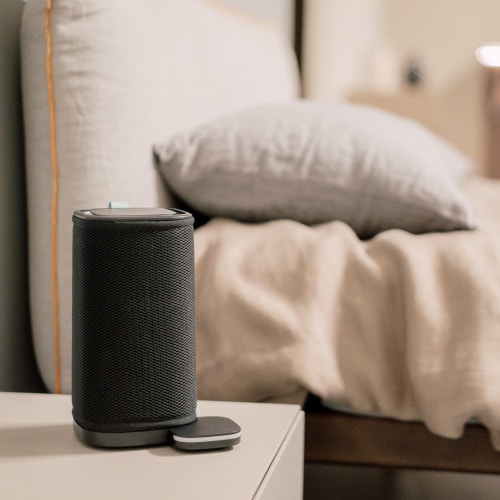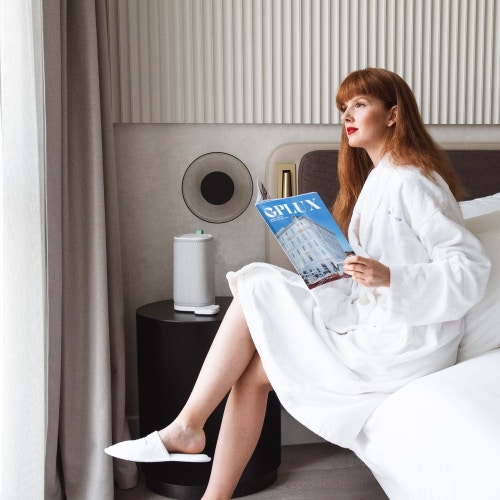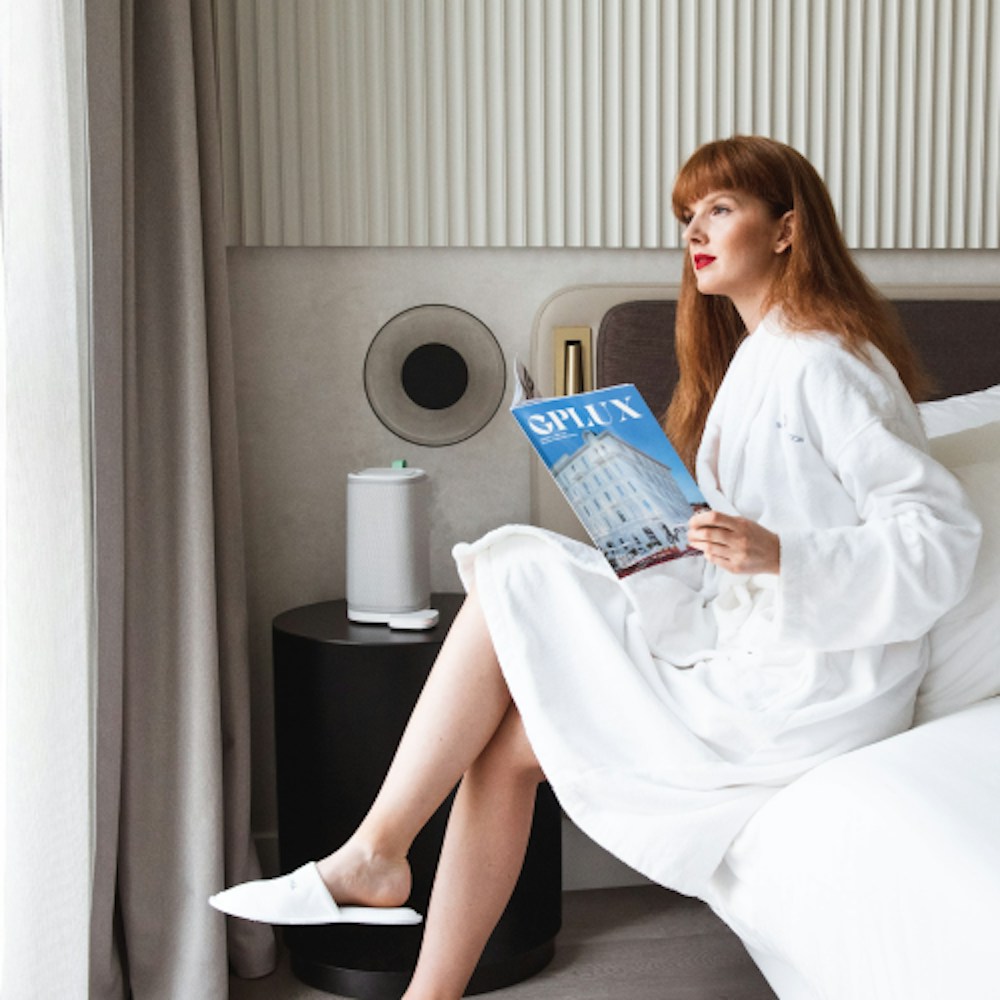
Indoor air quality in the hospitality industry
Hospitality: indoor air quality
Why is polluted air a problem in the hospitality industry?
- Generates a bad experience for customers
- Increases health risks and disease frequency
How can we take action to improve indoor air quality?
- Air rooms often at the end of the shift
- Properly maintaining ventilation systems
- Using an air purifier
The benefits of an air purifier in the hospitality industry
Vitesy: a company that takes care of your indoor air quality
- Natede Smart and Eteria
Come visit us at hospitality fairs
Hospitality: indoor air quality
The hospitality industry is a category that encompasses a wide range of facilities such as hotels, restaurants, bars, pubs, and cafes, where the main services offered are lodging, catering, food and wine experiences, and mind-body wellness.
In an environment such as hospitality where customer comfort comes first, among the various key factors in ensuring excellent service there is one topic that is rarely addressed in the correct manner: indoor air quality.
Indoor air pollution is perhaps one of the factors that contributes most to the well-being of a hospitality environment because if we think about it carefully, it is the one element that can always be present during the customers' stay in a facility.
Unfortunately, most business owners in this field are unaware of a really relevant fact.
According to WHO (World Health Organization) data, indoor air can be up to 5 times more polluted than outdoor air.
And in overcrowded environments such as those in the hospitality industry, it can be up to 10 times more due to various pollutants that are produced from countless sources, which we will go over in a moment.
Why is polluted air a problem in the hospitality industry?
Indoor air pollution in the hospitality industry is a problem for two different reasons.
1. Generates a bad experience for customers
You know that strange feeling of walking into a room and feeling that the air is heavy, stale, or that there are unpleasant smells?
These are the first clues that there is polluted air inside that space.
Unfortunately, however, in an environment such as a hotel room, people are often forced to stay in certain spaces in order to enjoy the services provided.
Here’s a good example: imagine you’re a hotel guest, perhaps after a long day of work. You would just like to relax and enjoy your room, your dinner or spend time in a particular area of the facility.
Now imagine that the moment you decide to take this time for yourself, a negative factor such as a strong odor, stale or heavy air comes into play: your reaction can only be negative and generate frustration.
Having this type of problem can not only be unhealthy, but it also generates a less than positive experience for customers who have to live with odors and heavy air.
This inevitably results in a negative review of the service both online and to their acquaintances, as well as an unlikely return to that facility.
All this for a problem that is solvable through proper precautions and simple solutions that we are going to analyze together.
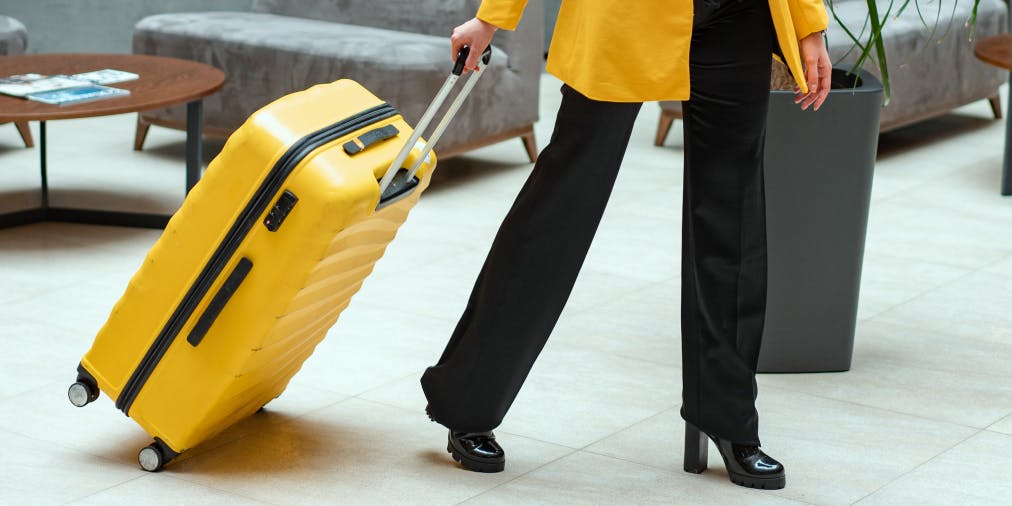
2. Increases health risks and disease frequency
Most people spend 90% of their time indoors. This is a really important figure and one that makes us realize how much in reality, although we often think that polluted air is only outside, it is much more common to breathe different pollutants in an indoor environment.
So if the air in an indoor environment is polluted, this translates into a greater health risk for all the people who populate a hospitality facility: both for the customers who stay and for the staff who work there.
This results in two issues:
- The customer is subjected to an unsafe and unhealthy environment.
- The number of workers who contract respiratory illnesses or infections increases, thus forcing owners to grant more sick days.
A research conducted by the CBI stated that in the United Kingdom air pollution is responsible for 3 million days a year of sick leave. If this problem could be solved, over 10 years, this would result in approximately £1.7 billion in savings for the country.
How can we take action to improve indoor air quality?
Since customer experience is a key aspect for a company in the Hospitality field, here are some tips for ensuring healthy and safe air quality.
Air rooms often at the end of the shift
A move that is as simple as it is effective. Opening windows in places that you know will be crowded is the most effective way to ensure recirculation of air between outside and inside, so as to avoid the stagnation of odors and other unpleasant pollutants, such as Volatile Organic Compounds (VOCs) or cooking fumes.
However, there must be extra care for the facilities that are based in a busy areas, such as the center of a city or near roads with high vehicle flow.
In this case, given the major problem of smog, it is best to avoid opening the windows during peak hours.
Properly maintaining ventilation systems
Counterintuitive as it may be, ventilation systems can also be a source of indoor air pollution.
There is no doubt that they are a great help in recirculating air in spaces where windows cannot be opened. Unfortunately, these systems need regular maintenance to be cleaned and to replace the filters that trap dust and particulate matter.
The environment within these systems, if not routinely maintained and treated, can be the primary source of the air pollution one breathes in an enclosed space. In fact, when they become particularly dirty and saturated, filters can become a breeding ground for the accumulation and spread of viruses and bacteria.
Thus causing increased transmissibility of respiratory diseases and increased susceptibility to lung infections.

Using an air purifier
Currently one of the most effective and convenient solutions, especially in the hospitality industry.
Air purifiers are technological products that allow people to eliminate pollutants within their enclosed spaces thanks to the effectiveness of their advanced filtering systems.
There are several solutions on the market and each has its own characteristics. They differ in:
- Price
- Filter
- Dimensions
- Purifying capacity
- Effectiveness on various categories of pollutants
The most popular and effective alternatives on the market are HEPA purifiers and PCO purifiers.
These two technologies are often mistakenly compared even though they involve extremely different air purification techniques.
In fact, HEPA filters merely block pollutants through filters composed of very tight mesh; while PCO (photocatalytic oxidation) technology acts in a totally different way.
Photocatalytic oxidation doesn’t block but rather eliminates pollutants through the power of the nanomaterials in the filter. This is possible thanks to a natural chemical reaction, 100% safe for humans, where the pollutants captured by the filter system are broken down into harmless substances and dissolved into the environment, thus returning renewed and healthy air to the room.
The benefits of an air purifier in the hospitality industry
The importance of these products within hospitality facilities is important to ensure an optimal stay and service for customers, but also a better working conditions for those who perform tasks within these facilities.
An environment with healthy and clean air has countless benefits:
- Increases people’s mental and physical well-being
- Increases concentration
- Reduces the chances of contracting seasonal flu
- Eliminates the “Sick Building Syndrome”
- Improves your mood
- Eliminates unpleasant odors
We recommend photocatalytic technology, especially our air purifiers!
Vitesy: a company that takes care of your indoor air quality
We have chosen to take advantage of PCO technology because it is considered the most advanced and environmentally sustainable alternative on the market.
We are a 100% Italian company offering indoor air monitoring and purification solutions.
The air purifiers we propose are more than just tools that remove pollutants in your office.
They are technological systems integrated with IoT technology that allow you to monitor your air quality and choose how and how much to purify the various areas of your indoor spaces.
What are these solutions we offer?
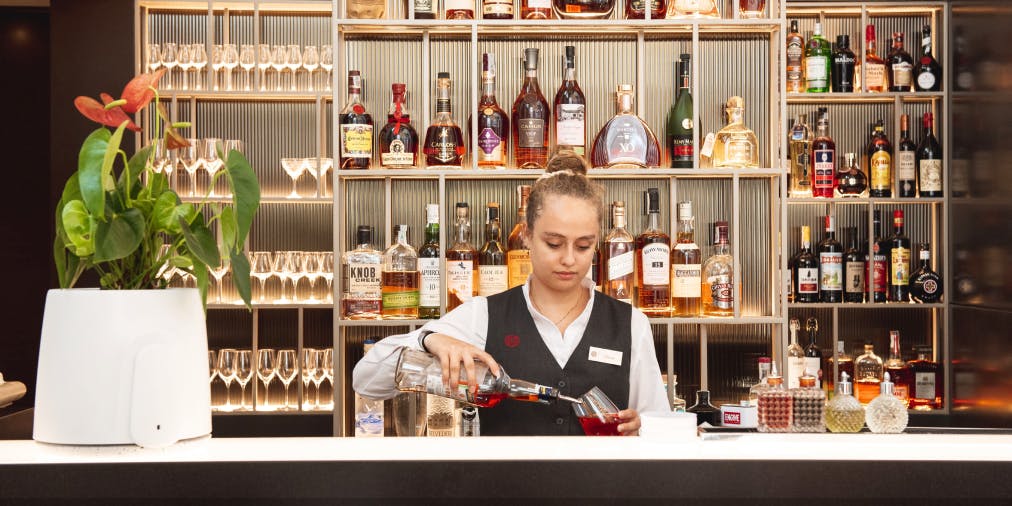
Natede Smart and Eteria
Natede Smart and Eteria are air monitoring systems that purify your environment using photocatalysis technology. In this way, they allow you to reduce dust and pollen allergy symptoms and achieve amazing results by eliminating:
- Viruses
- Bacteria
- Odors
- Volatile Organic Compounds (VOCs)
- Fine particles
Both Natede Smart and Eteria use a double purification process:
- Natede Smart uses the phytoremediation power combined with the photocatalytic filter;
- Eteria uses a fabric pre-filter together with the photocatalytic filter.
Both purifiers are equipped with air monitoring systems through which you can monitor the levels of:
- Temperature
- Humidity
- CO2
- Volatile Organic Compounds (VOCs)
- Fine Particles
In this way you can be more aware of the quality of the air you breathe as well as understand the effectiveness of its purifying action.
What’s the best part about our purifiers? Unlike other air purifiers on the market, they DO NOT HAVE A FILTER TO CHANGE.
The filter in Vitesy air purifiers is washable and sustainable because the photocatalytic technology removes the pollutants instead of just capturing them.
The internal filter of Natede Smart and Eteria is coated with tungsten trioxide (WO3).
Through the action of LEDs placed under the filter, the tungsten trioxide is activated, thus creating a very rapid and harmless chemical reaction that breaks down pollutants at the molecular level, without becoming saturated or consumed.
This thus allows you to save several dollars over the years in filters that need to be replaced, thereby implementing an effective, sustainable and safe action for the working environment.
Send us an email to sales@vitesy.com and we’d be happy to evaluate together what the best solution for your environment is!
Come visit us at hospitality fairs
Do you want to meet us face to face? Then come visit us at the fair in the next few days. We’re going to be at HORECA NEXT (Pordenone) on February 13-15.
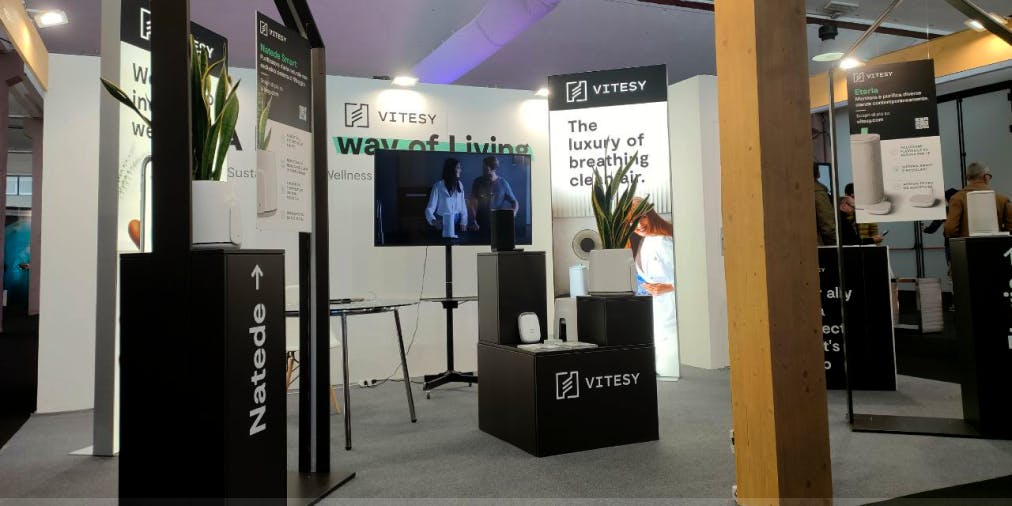
We would be happy to talk to you about how we can bring your company to the next level thanks to Vitesy’s purification technology!
